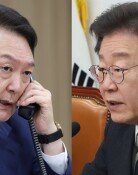U.S. president's first visit to Hiroshima seen through S. Korean eyes
U.S. president's first visit to Hiroshima seen through S. Korean eyes
Posted May. 12, 2016 07:42,
Updated May. 12, 2016 07:45
U.S. President Barack Obama will visit the Hiroshima Peace Memorial Park, a site dedicated to the memory of the victims of the U.S. atomic bombings at the end of World War II, on Friday after attending the Group of Seven summit in Japan. The White House said Obama will visit the site "to highlight (Obama’s) continued commitment to pursuing the peace and security of a world without nuclear weapons." It also said that the visit should not be seen as an apology to the bombing. As the USA Today pointed out, however, many Japanese are interpreting the visit as an apology. Former U.S. presidents did not visit the park over the past 71 years after the bombing because of concerns over such an interpretation.
Obama set out his vision for ridding the world of nuclear arms in the Czech Republic in April 2009, his first year in office, winning the Nobel Peace Prize in the same year. He has since made efforts for denuclearization and reduction of nuclear weapons. He might have wanted to leave a legacy by making a historic visit to the atomic-bombed city in his last year in office. The visit is also a "reward" to Japanese Prime Minister Shinzo Abe for positively cooperating with the United States in implementing Obama's Asia strategy and containment of China. Just as the New York Times pointed out that the visit would put pressure on South Korea and Japan to deal with their differences over history by cooperating more closely, the visit could send a message that the future is more important than the past.
The atomic bombings of Hiroshima and Nagasaki were tragic incidents that caused enormous civilian casualties. However, it is a historical fact that the bombings helped advance the end of the war started by Japan. Moreover, Japan has been highlighting its image as a war victim, rather than a war criminal, by emphasizing the fact that it is the only country in the world that was hit by atomic bombs. In a speech to a joint session of U.S. Congress in April last year, Abe expressed "deep repentance" for the war but did not offer an apology to neighboring victims including South Korea. Tokyo has yet to implement its agreement with Seoul to address the World War II sex slavery issue. It would be unacceptable if the Abe government, which has distorted history of infliction without hesitation, takes advantage of Obama's visit to Hiroshima to dilute its responsibilities for the war and avoids facing its history of aggression.
Inside the Hiroshima Peace Memorial Park stands a monument dedicated to Korean victims of the bombing who are estimated to account for about 10 percent of the total number of victims. We hope that the U.S. president will visit the monument as well to send an indirect warning to Japan for its wartime atrocities. If Obama is truly pursuing a nuclear-free world, he should also send a clear warning message to North Korea, whose nuclear development has emerged as the largest security threat on the Korean Peninsula and Northeast Asia.
권순활논설위원 shkwon@donga.com







